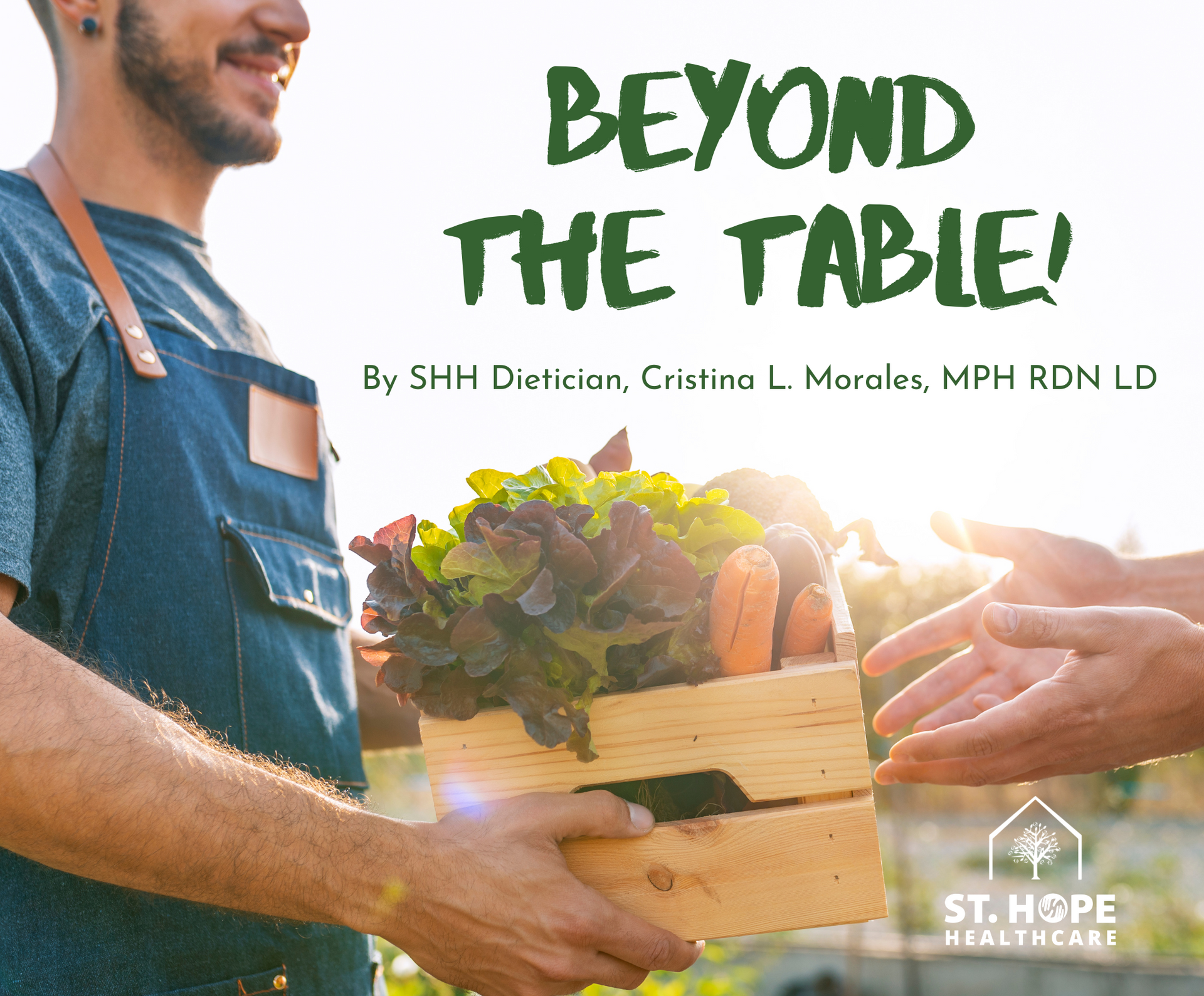Recent Posts

By Cristina L. Morales, MPH, RDN, LD
•
March 19, 2024
March is National Nutrition Month , and this year the Academy of Nutrition and Dietetics is focused on helping you Think Beyond the Table! When it comes to eating healthy you might already be on track with increasing your intake of fiber rich foods and selecting lean proteins. Or perhaps are learning how to prepare heart healthy meals with your Registered Dietitian. In whatever phase you’re currently in, let’s explore other steps we can take to continue building healthy habits. Food shoppers rely on local supermarkets to supply their homes with baked goods, produce, and more. And supermarkets rely on farmers to provide them with an assortment of goods. However, did you know that produce and meats are usually marked up in price to consumer at the grocery store. What If you could obtain fresh produce and other goods straight from the farmer? Obtaining goods from your local farmer can provide you and your family with healthy options. Additionally, this can help keep your pocketbook full while giving back to the community. When we buy direct from our local farmer, the middleman or the grocer is left out of the equation. This means there are no markup prices. Therefore, sellers can avoid increasing the cost of goods that are typically absorbed by consumers at the grocery store. And community members can access high quality meats, fruits, and vegetables at affordable prices. Thinking Beyond the Table can involve seeking opportunities that can enhance your diet and support local farmers. Small business farmers work hard to provide the community with organically grown foods. Farmers who raise cattle and other livestock provide community members with farm-raised and grass-fed beef, chicken, and eggs to name a few. And, in my opinion, grass fed meats taste better, are leaner, and generally less expensive than supermarket prices. Other desirable items sold by small farm businesses include specialty baked goods, desserts, and naturally produced dog treats. Some farmers use the milk from their goats and make naturally flavored popsicles and hand soaps. Other farm favorite items commonly sought out at farmers markets include local honey, fruit preserves, pickled veggies, spicy sauces, and fresh herbs. Due to the supply and demand for organic goods by community members, farm-to-table groups have sprouted in neighborhoods in recent years. Farm-to-table groups are typically organized and offered by community members that utilize social media platforms to reach consumers. Therefore, local farmers have been able to expand their reach of consumers and have been able to maintain long-standing customers. Community groups work together to streamline the processing of small orders by offering specific drop off and pickup sites. These groups can make the distribution and reordering of locally grown foods a snap to obtain. While large farm owners typically sell grains and other goods in bulk to local supermarkets. Buying locally can benefit not only your health, but also small business owners, and the environment. In addition, community programs that support local farmers often have recycling systems which are great for the environment. Farmers are therefore able to reuse egg cartons, canning jars, plastic containers and other storage and transport containers. This ultimately helps to cut down on manufacturing cost for the farmer and reduces the cost of fresh foods for the consumer. Another benefit is that local farmers provide organically grown foods that are usually harvested within days of making it to your table. Therefore, foods are fresher, healthier, and taste delicious. Supermarket produce that is not in season is usually transported in from surrounding states or countries. As a result, fruits and vegetables tend be less ripe and often lack the natural sweetness that fresh, in season produce offers. It is common practice for manufacturers to apply wax coatings and other preservatives to fruits and vegetables to help keep them as fresh as possible during transport to the supermarket. Overall, making the choice to buy local is a healthy choice. Eating healthy involves not just reading the food label, but also the support of small business farmers. Help support your local farmer by getting involved with farm-to-table groups and shop farmers markets for those special goodies that you just can’t get at a supermarket. Your efforts can help make community markets sustainable. Moreover, these weekly habits can trickle down to your family and loved ones and to future generations. Think Beyond the Table. Till next time, stay healthy and be well!
SHH 25th Anniversary!
November 4, 2024
0
minute read

Today we are beyond proud to celebrate 25 Years of Hope, Healthcare, Empowerment, Education and Advocacy! We would like to thank the communities that we serve and everyone that has contributed to the growth of St. Hope Healthcare throughout the years!
Here are a few fun facts about the making of St. Hope Healthcare throughout the years:
- We first began as a transportation service that prioritized getting clients to their appointments. Since then, we have grown into an innovative comprehensive federally-qualified Health Center with a variety of healthcare services, with transportation being at the root of it all.
- SHH began offering medical care in 2002 by way of a medical mobile unit! The service was accessible and in high demand which helped our organization grow rapidly. The high demand did however cause the mobile unit to breakdown frequently. This was for the greater good though, because it led to opening our first medical site in Conroe, Texas!
- The average age for employees in 2024 is around 39 years old, compared to 28 years old back in 2020. Nearly 1/3 of our staff are legacy employees! Building trust and community not only extends to our patients, but also to our employees. Thank you to our legacy employees that have been instrumental to SHH's success over the years!
- At the heart of our organization is HIV Care! Over the years we have become the 2nd largest HIV Care Provider in Houston for a reason! Our mission then still remains the same now, to provide an environment where people feel valued, empowered and cared for. In 2009, we expanded our services to OBGYN Care, which further lead us to becoming a Federally Qualified Health Center with full service medical care!
- St. Hope Healthcare broke records with BET's Emmy-winning "Rap It Up" campaign, providing HIV testing to over 800 individuals in one day at Prairie View A&M and sparking meaningful change across historically black colleges and universities, including Grambling University, Langston University, and Southern University!
- We honor the legacy of our esteemed board member, Willie Sylvester, who played a pivotal role in securing a state-of-the-art medical mobile unit for St. Hope through his connections with Brentwood Church, bringing free health screenings to low-income families in rural communities.








